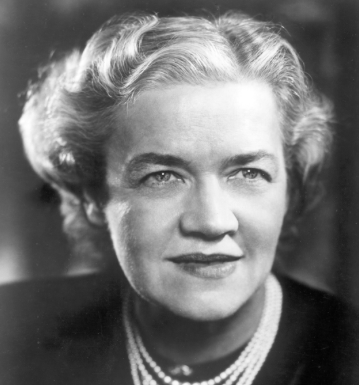When I featured Margaret Chase Smith as the Woman of Note on December 14, I knew she was a woman of many firsts. It was not until I researched further that I learned she was also a woman of great wisdom whose words resonate today.
Margaret Chase Smith lived for most of the twentieth century and was a woman of many firsts, but most important, she was a woman of principle. A lifelong Republican, she always voted her conscience and not the party line. She supported the rights of women, cosponsoring the Equal Rights Amendment in the mid-1940s, and worked to improve the statue of women in the military, but her influence was not confined to women’s issues, her state, or even her country.
After teaching school, working for a woolen company and managing business operations for a weekly newspaper, Margaret Chase married Clyde H. Smith, who ran for Congress and asked his wife to serve as his secretary. When he became ill a few years later, he persuaded her to run for his seat, with the assumption that she would resign when he recovered. Instead, Clyde Smith died, and Margaret Chase Smith became the first woman from Maine to serve in Congress. Six years later she became the first woman to serve as Senator from Maine. This also made her the first woman to serve in both houses of Congress. Another first came later when her seat was challenged by Lucia Cormier, the first time two women competed for a Senate seat.
Senator Chase Smith’s most important first, however, was in 1950 when she became the first Senator (not just the first woman) to speak against the Communist witch-hunt of Senator Joseph McCarthy. Only two years into her first term, she rose to deliver a speech entitled, “Declaration of Conscience.” The sole woman in the Senate at the time, only six other Senators co-signed her statement. After her speech, Senator McCarthy had her removed from the Permanent Subcommittee on Investigations and replaced her with Richard M. Nixon. The speech was so significant that Robert C. Byrd, a conservative Senator from the South, included her speech in a book of 46 classic speeches given in the Senate between 1830 and 1993. (The only other woman in Byrd’s book is Rebecca Latimer Felton, the first woman to serve as a United States Senator—for all of 24 hours!)
Following the speech, when President Truman came to the Capitol for lunch, he asked Senator Smith to join him. “Mrs. Smith,” he told her, “your Declaration of Conscience was one of the finest things that has happened here in Washington in all my years in the Senate and the White House.” She became an informal ambassador, traveling to 23 countries, and conferring with world leaders such as Churchill, DeGaulle, Adenauer, and Chiang Kai-Shek. She interrupted her international trip to return to Washington in 1954 when the vote was called in the Senate to censure Senator Joseph McCarthy. Senator Smith later ran for President of the United States and was the first woman to be placed in nomination by a major political party.
Her Declaration of Conscience speech did not mention McCarthy by name and its message, unfortunately, still resonates today (see link below). Senator Smith lives on—and not only in her words. Her Senate seat is held today by Susan Collins of Maine, also a voice of reason within the Republican Party. And, ironically, Senator Collins is also a First Woman To. . .the first woman to chair the Senate Permanent Subcommittee on Investigations.
LEARN MORE:
To read the full Text of her Declaration of Conscience Speech:http://www.americanrhetoric.com/speeches/margaretchasesmithconscience.html
Biographies: Sherman, Janann. No Place for a Woman: a life of Senator Margaret Chase Smith. and Wallace, Patricia Ward. Politics of Conscience: a biography of Margaret Chase Smith
Also visit the Margaret Chase Smith Library website for a biography, timeline, awards, degrees, and more: http://www.mcslibrary.org –
QUESTION OF THE WEEK:
Does witnessing Margaret Chase Smith’s courage, inspire you to take courageous actions?

